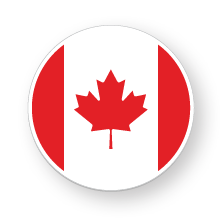 Canada
Canada
While employment numbers continue to defy expectations with their strength, the economy is clearly slowing. Aimed at combatting stubbornly high inflation, historically fast and large increases in interest rates by the Bank of Canada over 2022 have significantly driven up borrowing costs for both consumers and businesses. In turn, this has stalled the housing market and slowed overall spending and economic activity. With few exceptions, equity markets have provided little room to hide from the continuing downturn in stock prices, and rising bond yields have sideswiped prices. A relatively shallow recession is anticipated for 2023, and hopes are rising that the latter half of the year will turn more positive as inflation abates, interest rates moderate and the economy begins to regain its footing.
 United States
United States
Efforts by the Federal Reserve (the Fed) to rein in inflation from decades-high levels continues apace, as the economy remains too vibrant to ensure a return to the Fed’s inflation target of 2%. The Fed’s determination to slay inflation with higher interest rates has undermined stock valuations, while raising expectations that the economy will eventually succumb under the weight of sharply higher borrowing costs, in turn reducing employment and spending by consumers and businesses. This is likely to continue to affect stock prices as companies are expected to see profits fall over the coming months. However, these adverse conditions are likely to begin to ease as the year progresses, providing some hope for a recovery in the latter half of the year.
 Europe
Europe
Russia’s invasion of Ukraine has led to an energy crisis in Europe, as oil and natural gas supplies have been drastically reduced. The surge in energy prices has significantly contributed to overall inflation in the region, and has sent a chill through the housing market, while significantly reducing business borrowing and investment activity. Europe’s bourses have continued to slip as the European Central Bank raises interest rates to combat inflation, while also depressing bond prices in the process. With the global economy showing signs of sliding into recession in the first half of 2023, tourism is not expected to be the growth driver it was over the last two years, but hope still remains that the situation will ease in the latter half of the year.
 Emerging Markets
Emerging Markets
2022 brought with it an exceptionally strong U.S. dollar, which drove up the cost of Emerging Markets (EM) countries’ products and services in the world’s largest economy, while hurting borrowers financed in U.S. dollars. China’s COVID zero-tolerance policy has damaged the economy’s productivity and growth and contributed to the region’s and the global economy’s slowdown. With most EM nations’ leading indicators flashing warning signs of a sharp slowdown in production, borrowing and housing, and a likely recession the forecast for most of its key North American and European markets, the first half of the year looks to be challenging for EM, before giving way to a more positive outlook for the rest of 2023.
Past performance is not indicative of future results. Counsellor Quarterly has been prepared for use by RBC Phillips, Hager & North Investment Counsel Inc. (RBC PH&N IC). The information in this document is based on data that we believe is accurate, but we do not represent that it is accurate or complete and it should not be relied upon as such. Persons or publications quoted do not necessarily represent the corporate opinion of RBC PH&N IC. This information is not investment advice and should only be used in conjunction with a discussion with your RBC PH&N IC Investment Counsellor. This will ensure that your own circumstances have been considered properly and that action is taken on the latest information available. Neither RBC PH&N IC, nor any of its affiliates, nor any other person accepts any liability whatsoever for any direct or consequential loss arising from any use of this report or the information contained herein. This document is for information purposes only and should not be construed as offering tax or legal advice. Individuals should consult with qualified tax and legal advisors before taking any action based upon the information contained in this document. Some of the products or services mentioned may not be available from RBC PH&N IC; however, they may be offered through RBC partners. Contact your Investment Counsellor if you would like a referral to one of our RBC partners that offers the products or services discussed. RBC PH&N IC, RBC Global Asset Management Inc., RBC Private Counsel (USA) Inc., Royal Trust Corporation of Canada, The Royal Trust Company, RBC Dominion Securities Inc. and Royal Bank of Canada are all separate corporate entities that are affiliated. Members of the RBC Wealth Management Services Team are employees of RBC Dominion Securities Inc. RBC PH&N IC is a member company of RBC Wealth Management, a business segment of Royal Bank of Canada. ® / TM Trademark(s) of Royal Bank of Canada. RBC, RBC Wealth Management and RBC Dominion Securities are registered trademarks of Royal Bank of Canada. Used under licence. © RBC Phillips, Hager & North Investment Counsel Inc. 2023. All rights reserved.
